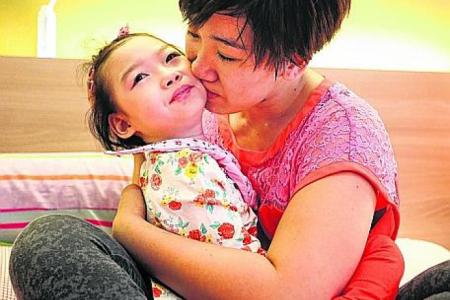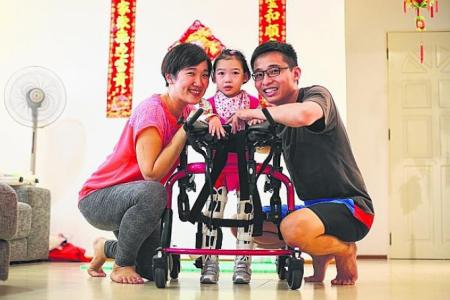She only prays for daughter's health
Madam Chang Pei Shih spends a whole week packing the bags for her family's trip to Malaysia during the Chinese New Year.
Her oldest child, Pei Xing Ying, suffers from a rare neural disorder known as Pachygyria which hampers her development and also causes mild epilepsy.
As a result, Madam Chang, 33, has to prepare 25kg of equipment, including breathing apparatuses, an oxygen tank, a baby stroller and more than 50 packets of medication - all for a three-day trip to Ipoh, where Madam Chang's parents live.
Xing Ying, five, was diagnosed with the disorder when she was four months old.
She cannot speak, cannot stand without a special walker and can consume only softer food and milk prescribed by a nutritionist.
But this Chinese New Year, the family got a bit of a cheer when Xing Ying managed to stand straight in her walker. She usually is able to manage only a slouch.
"To us, any small bit of improvement is a victory," said Madam Chang, adding that Xing Ying has been improving at a steady pace.
"As parents of these children, we don't pray for wealth or success. All we pray for is our children's health."
GIVING UP HER JOB
Madam Chang continued working as a retail supervisor until Xing Ying turned one.
Before that, a nanny would take care of her while her parents were at work.
"I just couldn't work anymore as I could not balance having to work and care for my daughter as well."
Madam Chang has two younger sons aged three and four.
She said that due to having to constantly take care of Xing Ying, she does not get to take her two sons out much.
"I feel very bad about it, but I don't really have a choice."
Madam Chang's aunt also stopped work to help take care of the children, after Madam Chang gave birth to her second child.
"Family is extremely important when going through all of this. Without my family's support, I wouldn't know what I would do," she said.
Her husband, Mr Peh Wei Siang, 36, owns a company that sells construction material. They live in a five-room flat in Hougang.
LEARNING TO COPE
Although she is now well versed in taking care of her daughter, Madam Chang did not start off as able.
She told The New Paper: "My husband and I had no experience in taking care of children and when our first child was so sick, we panicked."
When she was younger, Xing Ying was sent to the hospital often. But as her mother learnt to handle her problems, there has been less of a need to do so.
Madam Chang said: "We just can't afford to send her in for every little thing. But whenever we're in the hospital, I learn from the nurses, so that I can take better care of my daughter."
She also helps to guide Xing Ying through physiotherapy and massages her naturally stiff muscles daily.
Despite her condition, Xing Ying is a jovial child, smiling often.
Madam Chang said: "She's very aware of her surroundings. If you're pointing a camera at her, she'll turn her head to smile for you."
On Saturday, her family hosted two other families for dinner at their home.
They had also attended other gatherings with the other families during the Chinese New Year period.
There are more than 20 parents in the informal support group, but not every family attends these meet-ups due to differing schedules.
Most of the group got to know each other through the school their children attend, Rainbow Centre Yishun Park School, which offers special programmes for children with developmental issues and other forms of disabilities.
Xing Ying's mother, Madam Chang Pei Shih, said they try to make it a point to go for these gatherings as they feel that they are important for the families and for the affected children as well.
"These meet-ups are important because it also gives our other children opportunities to play with one another," she said.
"Of course, we meet up to provide support for each other as well," she added.
"If I run into any problems, I can consult the group as well," said Madam Chang.
"And the best part is, the equipment needed to take care of our children can be shared as well, as it is all very expensive."
WHAT IS PACHYGYRIA?
It is a rare development disorder that affects the cerebral cortex, which is the outermost layer of the brain.
The disease makes the brain very smooth. This causes parts of the brain to not be able to function properly.
People with Pachygyria suffer from developmental delay, epilepsy, poor muscle control, and have a smaller than normal head size.
The disorder happens in the womb, while the foetus's brain is still developing.
Treatment of the disorder can include anti-seizure medication, physical therapy, speech therapy, or vision therapy.
Get The New Paper on your phone with the free TNP app. Download from the Apple App Store or Google Play Store now


